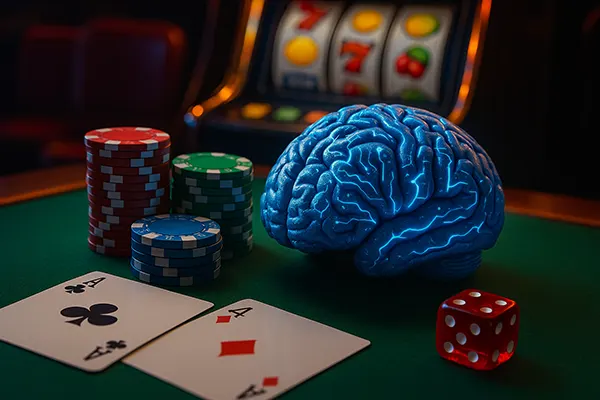
Adaptive Difficulty Slot Machines: A New Evolution in Online Gaming
In recent years, the online gambling industry has entered a new stage of development, where artificial intelligence and behavioural analytics meet user experience. One of the most promising innovations is adaptive difficulty slot machines — games capable of changing their complexity and volatility depending on the player’s style, history, and engagement level. As of February 2025, this trend is gaining serious momentum, sparking both excitement and concern in equal measure.
How Dynamic Volatility Adjustment Works
Adaptive difficulty in online slots primarily relies on dynamic volatility algorithms. Traditional slots operate on fixed volatility, determining how often and how much a player can win. In contrast, adaptive systems analyse a player’s interaction in real-time — their bet size, frequency, duration of sessions, and even emotional indicators like rapid clicking or long pauses. Based on this, the system may adjust the volatility curve to retain interest.
This technology allows games to respond to signs of boredom or frustration by offering a string of small wins to re-engage the player, or alternatively, increase volatility when a player seeks more thrill. Such mechanics require deep integration of machine learning models that predict behaviour and adjust parameters without affecting the regulated RTP (Return to Player) percentage.
As a result, each player’s experience becomes unique. A novice may receive a more forgiving gameplay loop, while a high-roller might be pushed toward larger risks and rewards. This not only increases retention but also dramatically changes the psychology of gambling interaction.
Examples of Smart Slots That “Learn”
By 2025, several developers have launched slots with adaptive systems. NetEnt’s experimental AI-driven slot “NeuroSpin” tailors its gameplay through behavioural clustering, segmenting players and delivering customised volatility paths. Similarly, Evolution’s “Pulse Slots” feature real-time mood adaptation, where gameplay adjusts based on biometric inputs captured through connected devices or session metadata.
Pragmatic Play has also released its “PulseWave” series, integrating predictive modelling to assess when a player is likely to churn and offers adjusted win patterns to extend session duration. While RTP remains statistically consistent, the perceived flow of gameplay differs substantially between users.
This kind of technological customisation has already started to reshape loyalty programs and bonus triggers. For example, some platforms link bonuses to volatility responsiveness — rewarding those who continue playing after a spike in difficulty or after adapting to changing game conditions.
Manipulation or Innovation?
The use of adaptive difficulty has triggered ethical discussions. Critics argue that this form of personalised gameplay borders on psychological manipulation. By learning from user behaviour, the slot becomes more than just a game of chance; it becomes an intelligent system with the goal of extending playtime and increasing spend — potentially at the cost of player well-being.
From a regulatory perspective, adaptive slots raise red flags. Several European jurisdictions are reviewing whether real-time volatility adjustments could be classified as deceptive, especially if users are unaware of the modifications. Transparency in how and when these adjustments occur is currently lacking, making informed consent difficult.
On the other hand, supporters of adaptive systems point out that the same technologies can also protect players. For instance, if a system detects high-risk behaviour (like erratic betting or signs of compulsive play), it could automatically reduce volatility or recommend a break. This dual-edged nature of adaptive mechanics demands a responsible design approach grounded in ethical AI principles.
The Future of Responsible AI-Driven Slots
By February 2025, responsible gaming authorities such as the UK Gambling Commission and Malta Gaming Authority are beginning to draft guidelines for adaptive slot features. These may include mandatory player notifications when gameplay conditions change, opt-in mechanisms, and detailed explanations in game info panels.
Meanwhile, developers are experimenting with “fair-play transparency overlays” — visual indicators that inform players of changes in volatility. These overlays could become industry standard, offering players better control and understanding of the dynamic mechanics in play.
Ultimately, the integration of adaptive difficulty into online slots signals a shift toward AI-personalised gaming. Its success, however, hinges on trust and transparency. As the industry evolves, maintaining user rights while offering immersive innovation will be the cornerstone of ethical game development.

Player Psychology and Experience Evolution
Adaptive slots mark a significant change in how users perceive luck and strategy. While traditional slots offered a standardised randomness, adaptive ones create a feedback loop where players subconsciously respond to personalised game cues. This alters expectations, and in some cases, may even cause players to overestimate their influence over outcomes.
Research conducted in late 2024 by the Gambling Insight Institute found that 37% of frequent slot players believed adaptive games gave them “better odds” after a win streak. In reality, while RTP remains fixed, the feeling of control increases, fuelling further engagement. This “illusion of agency” is now a key focus for psychologists studying the impact of AI on user behaviour in gambling environments.
Designers are already leveraging these insights. Visual and audio cues, once standardised, are now being adapted dynamically — changing tempo, light patterns, or sound effects depending on predicted user emotion. The psychological impact is subtle but powerful, creating an increasingly immersive — and arguably manipulative — environment.
Balancing Immersion with Ethical Design
To address these concerns, several game studios have begun to collaborate with behavioural scientists. The goal is to create emotionally intelligent games that not only engage but also protect. Studios like Relax Gaming and ELK Studios are experimenting with “emotion-aware timeouts” and adaptive auto-limits based on mood analysis.
Moreover, independent watchdogs are calling for third-party audits of adaptive slot mechanics. These audits aim to ensure fairness and to assess whether AI models disproportionately target vulnerable users. Some platforms now allow players to opt out of adaptive features altogether, favouring static play instead.
As the debate continues, one thing remains clear: adaptive slots are redefining the gambling landscape. Whether they become a force for positive transformation or a new form of digital exploitation depends entirely on how the industry chooses to wield this powerful tool.



